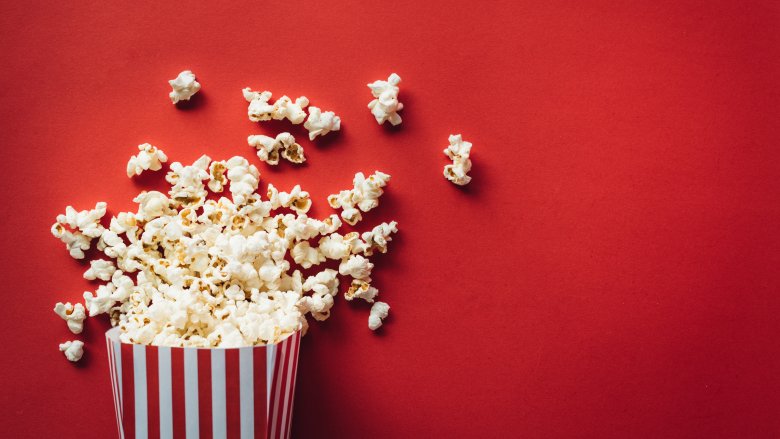What Makes Popcorn Pop?
Popcorn obviously doesn't grow on stalks in the corn field as the big, poofy stuff you get when you go to a movie. How, then, does it get from its beginnings as a super hard, tooth-breaking, yellow kernel and into your bucket of popcorn as a delicious snack?
The folks at the Popcorn Board are here to help clue everyone in. Popcorn is made up of three parts — the germ, the endosperm, and the pericarp, which is commonly known as the hull. Popcorn is the only common type of corn that can pop, thanks to the thickness of its pericarp. It happens to be the right size and thickness to allow it to burst open, while other types of corn have hulls that simply do not, thank you very much.
Popcorn also has a small bit of water tucked away inside each kernel, stored within a circle of soft starch. It's this water, combined with heat, that causes the popcorn to pop. Once the heating process begins, the water inside heats up and expands, and once it hits around 212 degrees, it turns to steam and turns the soft starch inside the kernels into a gooey substance. For a kernel to successfully pop, it needs to consist of around 14 percent moisture, which could explain why not all of your kernels pop when all is said and done.
It doesn't stop there, though. The kernels continue to heat up, and by the time the temperature reaches around 347 degrees, it's showtime. The pressure inside the kernel ramps up to around 135 pounds per square inch before it bursts its hull open. Once it pops open, the built-up steam is released, and the gooey starch springs out, inflates, and cools immediately, forming the familiar shape of the popped popcorn. The hull is now relegated to tiny bits on the edges (which everyone knows will likely get stuck in your teeth at some point). That's some firepower.
A kernel of popcorn can expand to be 40 to 50 times its original size when it's done popping, which is good, as now you're able to enjoy your snack far more than if you somehow managed to chew up the unpopped kernels.
